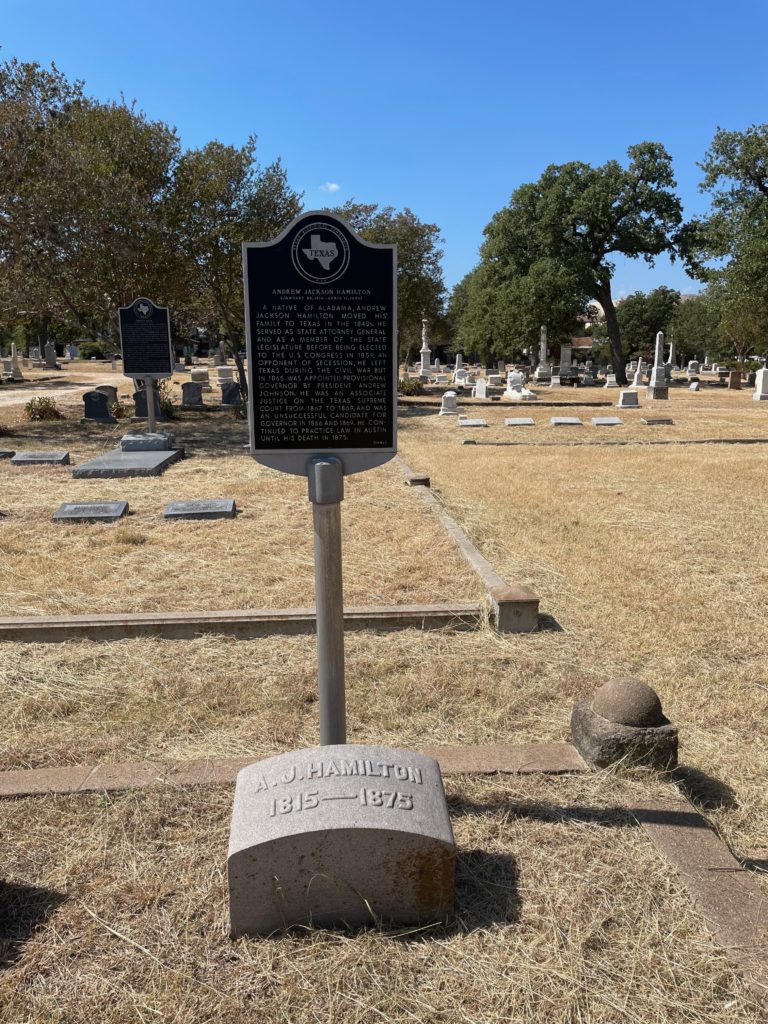Erik Visits an American Grave, Part 1,252
This is the grave of Andrew Jackson Hamilton.

You can read the historical society biography above, but we’ll go ahead and expand on this a bit. Hamilton was born in 1815 in Huntsville, Alabama. The family was well enough off that Hamilton got to go to college and law school, opening a practice in Talladega after he passed the bar. But Texas was calling southerners. His brother had already moved to La Grange, Texas, and so in 1846, Hamilton joined him, starting a law practice there. He then moved to Austin in 1849 due to his political ambitions.
Those political ambitions paid off pretty quickly, as he was immediately named the acting state attorney general after the current holder of the position left for some reason. He was a Democrat–they all were. But the Democratic Party was still split over questions of slavery. Yes, they all supported slavery. I am not 100 percent sure that Hamilton owned slaves, but I’d be awful surprised if he did not. But there were divisions over how aggressive to be on it. The radicals wanted eventual secession and they wanted to reopen the slave trade. The moderates were opposed to both of these things. Hamilton became a leader of the latter. He was elected to the Texas House in 1850 and took to the floor many times to denounce the extremism of some of his colleagues.
In 1854, Hamilton won election to Congress. Again, he was a moderate Democrat in a time when that was harder and harder to hold onto. He was known in his three terms in Congress as someone who tried to solve the secession issue by trying to find common ground. Of course that common ground was fundamentally about protecting slavery, but still, he wasn’t Preston Brooks or someone like that. He was on a House committee in 1860 that sought but failed to solve the secession crisis.
Hamilton decided to leave Congress in 1860. He returned to Texas and won a position in the state Senate. There, he opposed secession. In fact, he became a staunch Unionist. In the face of actual secession, many Unionists acquiesced and either came to support secession or just shut up. That was not Hamilton. He continued to denounce the treason in defense of slavery. And so, he faced very real threats to his life. In fact, he had to flee to Mexico in 1862 or he almost certainly would died. Texans were known for their slaughtering of opponents so this was real.
Well, Hamilton obviously had to live in the North or in Mexico. He had a chance to make good money giving an anti-Confederate speaking tour in the Northeast and so he did that. He was feted as a hero in Boston and other strongly pro-Union and pro-Lincoln cities. He started using the term “Slave Power” in his speeches too. He was just fully disgusted by the South. Now, Lincoln had hoped to invade and take over Texas and he preemptively named Hamilton as the military governor of the state. Hamilton went to New Orleans to prepare for this, which was already under Union control. But an attempt to invade Texas failed and in fact it was the last area in the Confederacy to be conquered by the Union. So Hamilton pretty much just spent the rest of the war hanging out in New Orleans.
In 1865, when Texas was finally put down, Andrew Johnson named Hamilton as the provisional civilian governor of Texas. This lasted for about fourteen months. It was hard. First, Texan whites despised Hamilton as a traitor. The violence in Texas toward the now free slaves probably topped anywhere else in the South. The Comanches were still around too so there was violence as well on the frontier. But the real issue was that he and Johnson grew to hate each other. Hamilton ended up rejecting Johnson’s conservative and effectively nonexistent Reconstruction and united with the Radical Republicans in Congress. He knew the only way to handle Texas was to crush the resistance. He favored Black suffrage too. But he resigned in 1867, knowing he could implement none of this.
Hamilton moved to New Orleans and worked as a bankruptcy court judge for awhile. He did come back to Texas later and got named to the Texas Supreme Court. He tried to run for governor again in 1869 but Edmund Davis, another Unionist, defeated him. He became a full-fledged Republican around this time. Unfortunately, he changed his mind on Black suffrage, which so many Republicans did in the early 1870s. As it turns out, the Republican Party was not pro-Black so much as it was a different way of being pro-white.
Hamilton may have survived the Civil War but he couldn’t survive the other scourge of the nineteenth century–tuberculosis. He died of it in 1875, at the age of 60.
Andrew Jackson Hamilton is buried in Oakwood Cemetery, Austin, Texas.
If you would like this series to visit other southern Unionists, you can donate to cover the required expenses here. Newton Knight is in Jasper County, Mississippi and Sam Houston is in Huntsville, Texas. Previous posts in this series are archived here.


